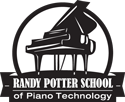Since we started our home-study school in1986, our goal has been to provide the training requested by our students. We have had many requests from students for advanced training in high level tuning, repairing and regulating. Others have asked for personal, in-depth, hands-on training to hone and upgrade their skills. Quite frankly, we know this is difficult to find.
We have always encouraged our students to take advantage of the classes offered through their local Piano Technicians Guild chapter, at regional and international PTG conventions, and through the factory training offered by manufacturers, both at dealerships in cities around the U.S. and Canada and at their facilities. But these opportunities are very limited, and many (most) technicians do not have access to these resources. It can take years to get into just one of the manufacturer’s courses. Space is so limited you seldom get to attend unless you are doing work for one of their dealers. The Baldwin course, which I attended at their factories in Conway, Arkansas, in 1979, is no longer being offered. Neither is Kimball University, which I attended at their French Lick, Indiana, factory in 1990. (Both of their US factories are closed.) I had been tuning over seven years before I was able to attend Yamaha’s Little Red Schoolhouse in 1983, and over ten years before I was able to attend Steinway’s Factory Technicians Training Course. (In each case, I was doing dealer work at the time, and with the exception of Kimball and Baldwin, who no longer makes pianos, still do.) In 1990 I was privileged to train with Franz Mohr (Horowitz’ technician for 34 years) at Steinway’s Concerts and Artists Division at Steinway Hall in Manhattan (I do most of the concert work in our area), and in 1992 attended Steinway’s Tone Regulation Seminar at the factory on Long Island. In 1991 I attended Yamaha’s Disklavier Piano Service Seminar and in 1996 PianoDisc’s Service Seminar. In my home PTG chapter, Portland, Oregon, less than ten technicians have been able to attend even one factory training school. Later I got to travel to Europe, and train at the Steingraeber Factory, and then at Bösendorfer Haus in Vienna with their concert technicians, as well as at the factory. But sixty other Portland chapter members, and four thousand of our students and graduates, have yet to get into any of them, though some have been trying for a number of years. We have technicians taking our Continuing Education course who have been tuning 25 and 30 years – but have not been able to attend even one manufacturer’s factory training seminar!
“So where can we get some in-depth, one-on-one, hands-on personal training?” students regularly ask. “Where can we get personal help to prepare to take our PTG Exams?”
After getting so many requests, we developed our own very intensive, week-long, hands-on course. We work with students 11-12 hours a day for six days! I have tried to incorporate the best training from the factory training I have received, plus additional training not taught by those programs.
Our first Advanced Training Seminar was held in1991 at Baylor University in Waco, Texas. “Students” these first yeas were required to have at least five years experience to even attend. It was such a success we decided to continue it. We began having requests from students and technicians with less experience, to help them make sure they had a solid foundation and “jump-start” their new careers, so developed our Beginning Training Seminar for very new students, and our Intermediate Training Seminars for students and technicians who were already doing some tuning, but wanted one-on-one training to improve their skills. We held our seminars at Baylor for two years, then moved them to Northwestern College in St. Paul, Minnesota, held it one year at the PTG Home Office in Kansas City, then moved our seminar to Montana State University’s School of Music in 2006.
We now hold our annual Beginning and Intermediate Training Seminar (BITS) at Cunningham Piano in Philadelphia, Pennsylvania. In order to assure students receive one-on-one attention the seminar is limited to 12 students. There are two full-time instructors, Randy Potter, RPT, and Ward Guthrie, RPT. “Full-time” is an understatement, because we work with students 11-12+ hours per day, for six days. Instructor-to-student ratio is about 1-to-6. Our instructors are well-known teaching technicians from around the country.
The six-day, 60+hour seminar includes group lectures and private one-on-one hands-on training in beginning through high level tuning and regulating techniques, depending on the skill and experience level of each student. Since we do so much one-on-one work with each student in the tuning rooms, we are able to work at the level of each student – to take them to the next level in their own abilities. Students work with a variety of pianos; most of them new pianos Cunningham is providing for us. During the week we aspire to have a basic seminar in servicing the Yamaha Disklavier, and the PianoDisc system pianos, if Cunningham has these in stock when we are there.
One of the goals of the seminar is to prepare technicians to take and pass their Piano Technicians Guild Registered Piano Technician Exams. While the beginning, and some intermediate, students are not going to be able to pass them upon returning home (because without the experience of tuning hundreds of pianos they will yet be fast enough to pass the timed exam), they will have the knowledge and tools to be able to tune in a competent way that will lead them there with practice. Many of our advanced students come specifically to help them prepare to pass the tuning or technical exam.
Our seminar is open to all technicians – whether or not they have taken our home study course. See the Registration Form for more details.
